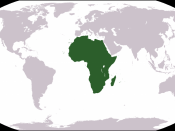European Influence Between 1400 - 1800 in the Americas
(Africa and Asia)
The years 1400 - 1800 were a time of exploration and discovery. It was a time when Europe attempted to dominate the whole world. The building of huge, sturdy ships, known as caravels, helped them sail around the world easily to discover new lands by constructing ports and empires in Asia, Africa, North America, and other such regions. Some of their many motives were to spread Christianity among the people they invaded, and introduce the newly invented technological innovations. They influenced the people they invaded in a lot of ways, but mainly, they changed their beliefs, principles, religions, and other ritual routines that those people had been practicing for centuries. Though their influence on Africans was somewhat the same as those of the Asians, there were also a lot of differences in their influential explorations.
Prince Henry the Navigator helped conquer the Muslim city of Cueta in North Africa in 1415.
This was the beginning of the many explorations that the Europeans would be making into Africa throughout the centuries. By the time Henry died in 1460, the Europeans, individually the Portuguese, had established a series of trading ports along the coasts of Africa. There, they traded with the Africans for gold, silver, ivory, and other such profitable items. These Europeans saw the Africans as "barbaric" and without any religion. The Dutch established a port called the Cape of Good Hope on the southern tip of Africa. They tried to Christianize them and make them civilized. Later on, they dominated Africa and took complete control over the Africans. As the found a sea route to Asia from Africa, they started trading the Africans, whom they had enslaved, with the Indians.
As the Europeans found the sea route to India from Africa, they started trading with the Indians as well. They tried to dominate India because there were more spices and other luxury goods available. When they arrived in India, they were very disappointed to find out that the Indians were not interested in what they had brought; instead, the Indians wanted to exchange the silver bullies with them that they had brought for emergency uses. As they moved deeper into India, they started taking control of the spice trade from the Muslims. The captured many port cities in India, and then afterwards sailed into the East Indies. They took control of the Strait of Malacca of the Malayan Peninsula, where a lot of spice was found, and named the island "Spice Island". European arrival in China was not of any offense to the Chinese at first, but when they saw that the Europeans were Christianizing them, they became angry and decided to stay in a state of isolation. They still traded with the others, but tried to keep themselves intact from the effects of Westernization.
The European influence on Africans and Asians was similar in a lot of ways. Firstly, the motives that the Europeans had were the same in both regions: they wanted to convert the people to Christianity, introduce the new technological innovations within the regions, and exchange their goods with those of the Africans and Asians. They Christianized as many places in Asia and Africa as they could. However, the Asians remained mostly unaffected by European contact; thus the Europeans did not succeed in westernizing Japan, China, and a Muslim kingdom of Philippines. In both regions, the Europeans admired the fact that the Africans and Asians had a lot of gold and silver bullies to trade with the Europeans. The Europeans thought it'd be convenient for them to reach Africa and then find a sea route to India, which they did. They built ports and factories in both regions, where they kept the goods that were to be shipped to Europe. One thing different was that they enslaved the Africans in Africa and won more converts from Africa than they did from Asia because the Asians kept themselves more secluded.
The Europeans were avaricious people who sought greater wealth as they invented new things and started building stronger ships. They wanted to explore new lands, invading innocent people. Their influence on both of these regions played a greatly effective role in the history of the world. They sought to spread their ideas and beliefs around the world and, being greedy, desired more and more products for exchange goods. They influenced most parts of Africa and several parts in some countries of Asia.
---------------------------------Shehnaz Haqqani


